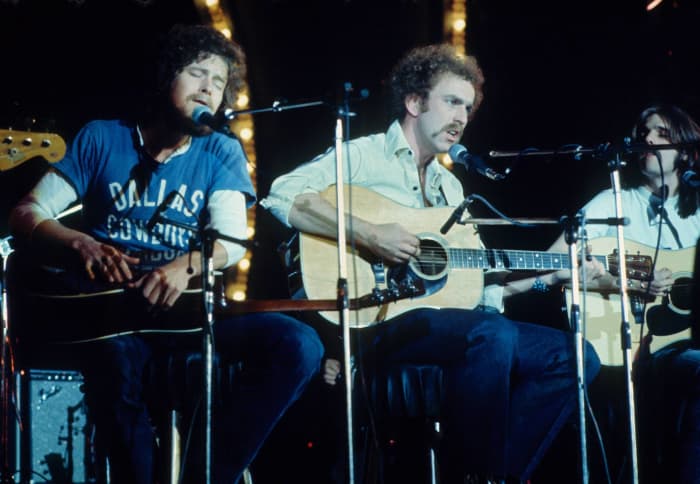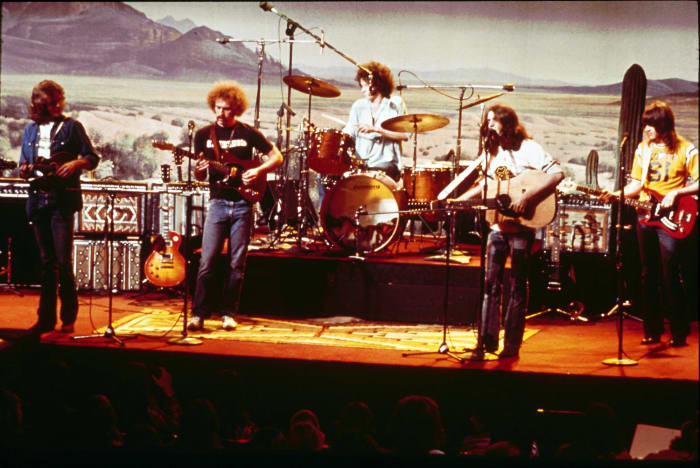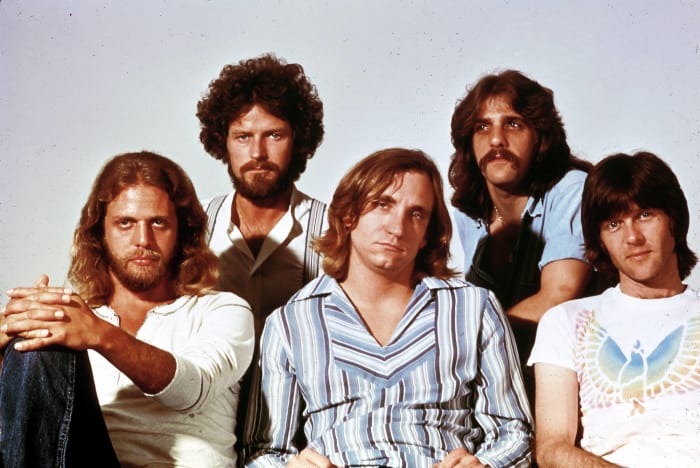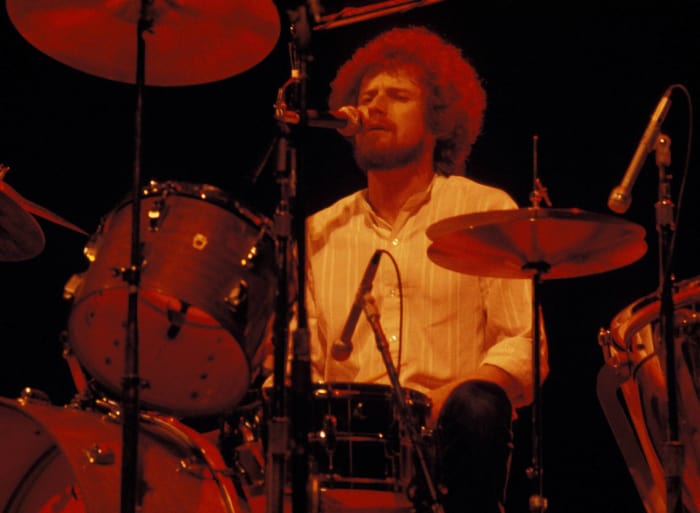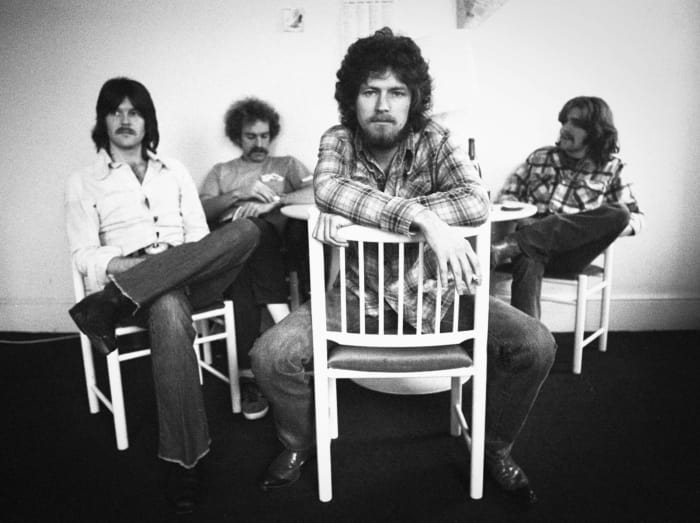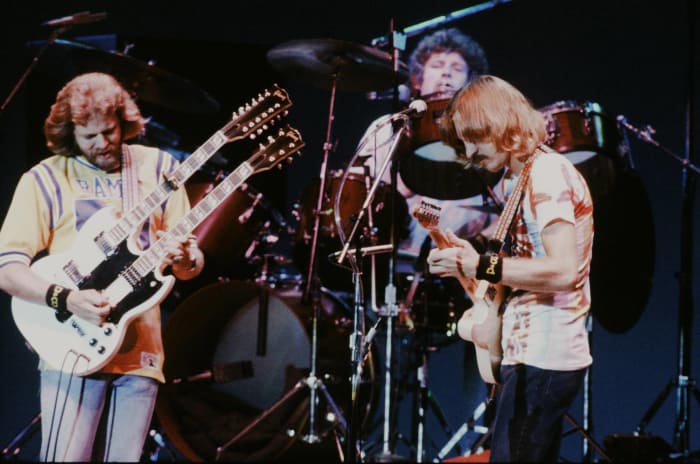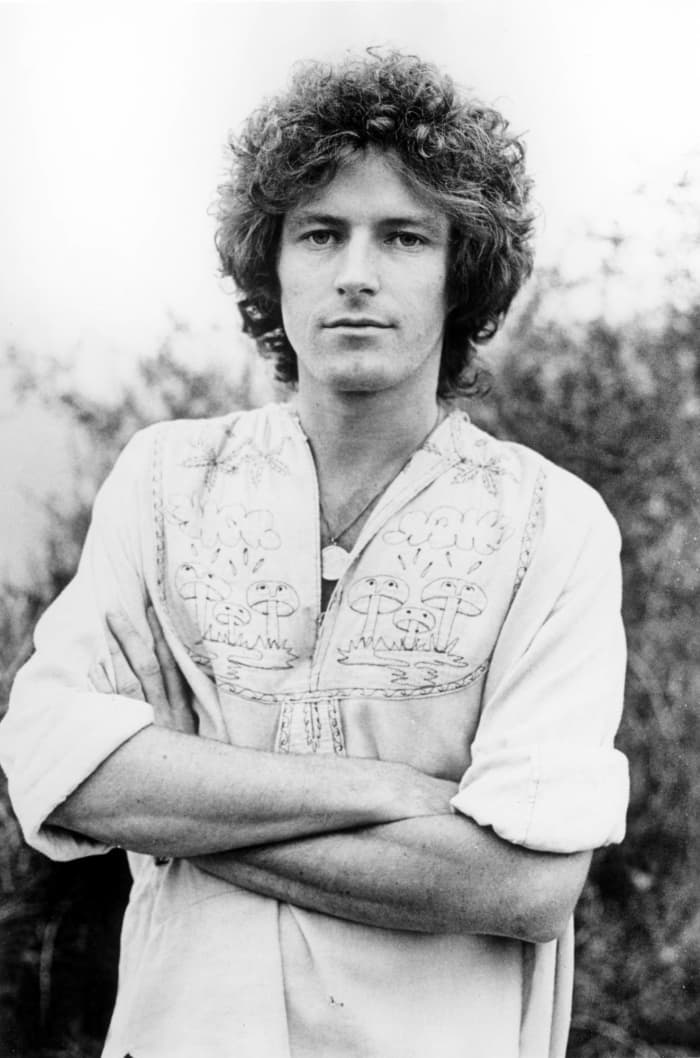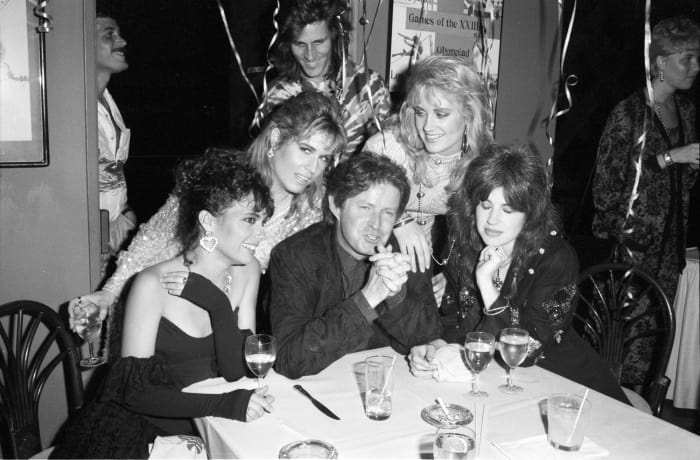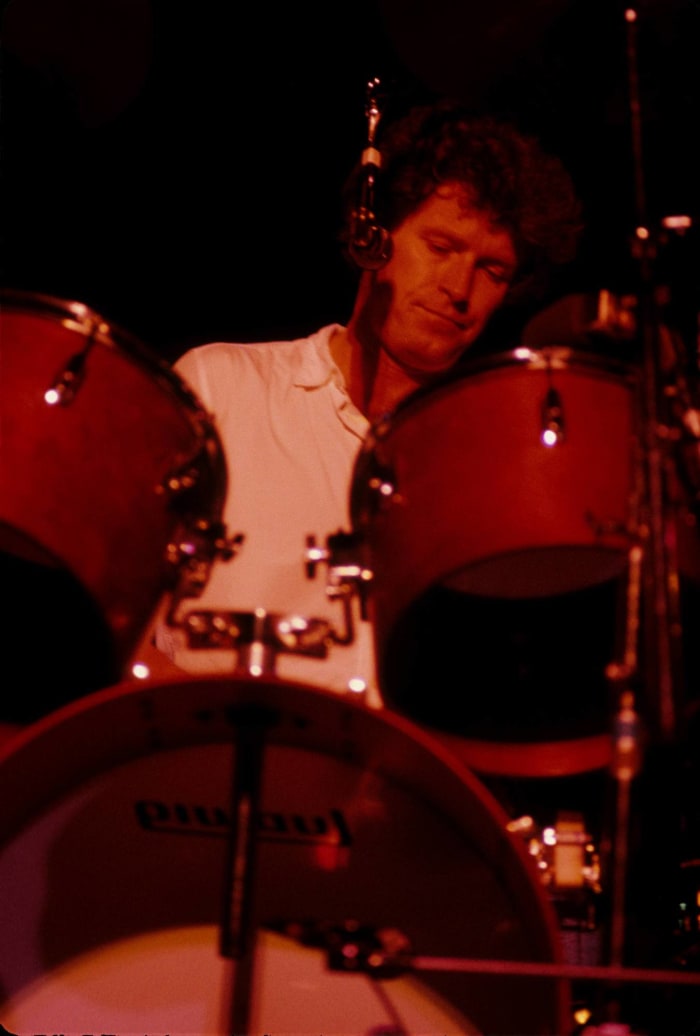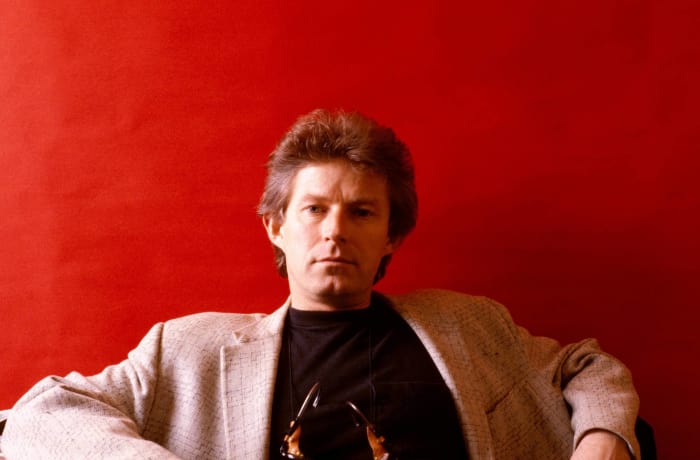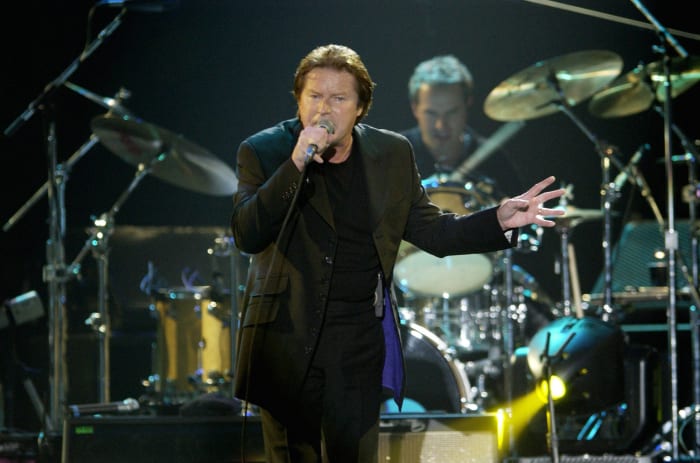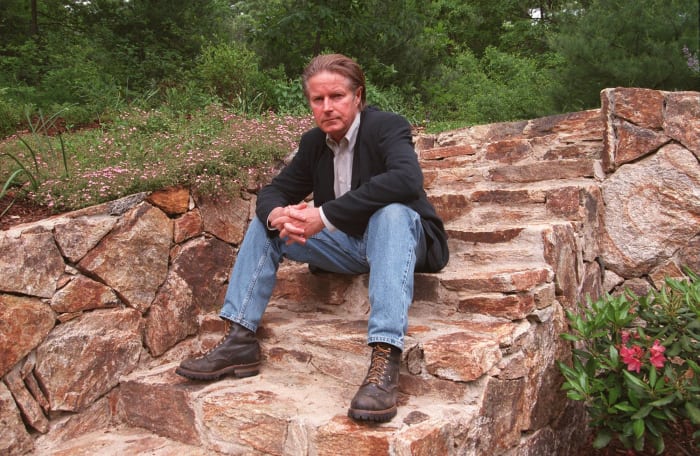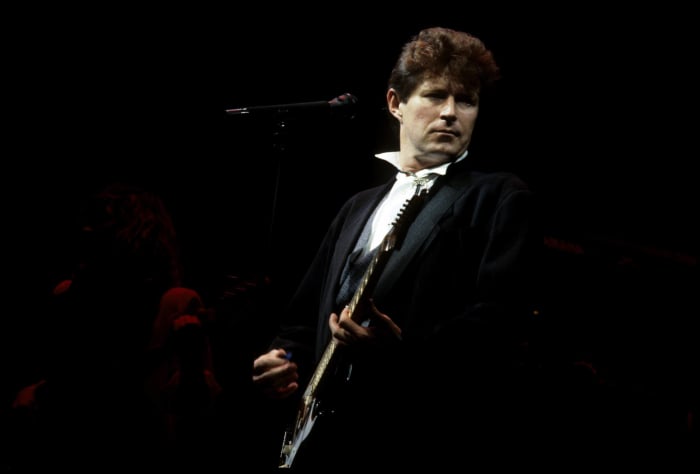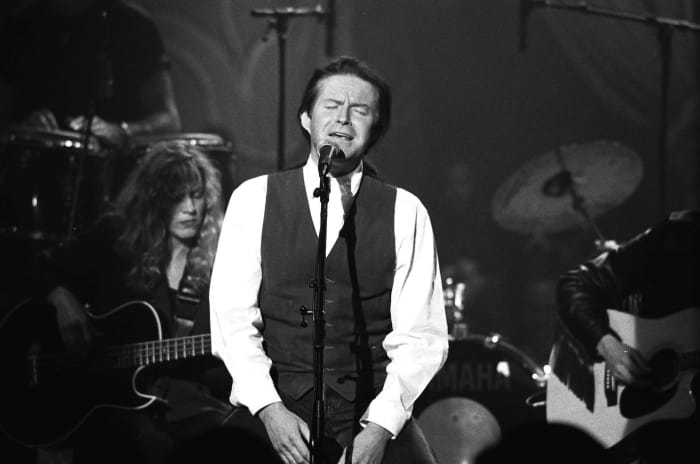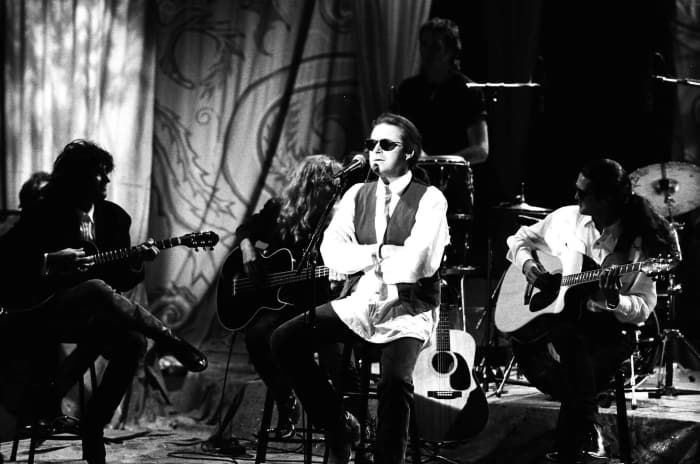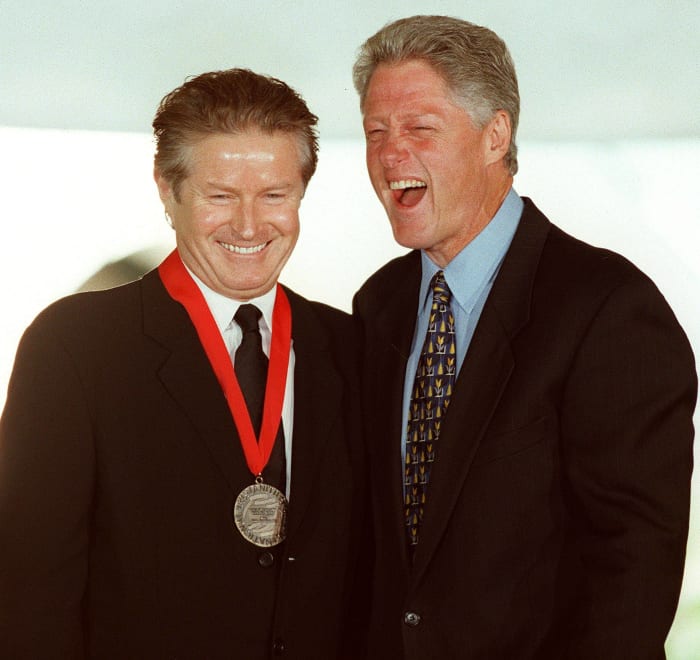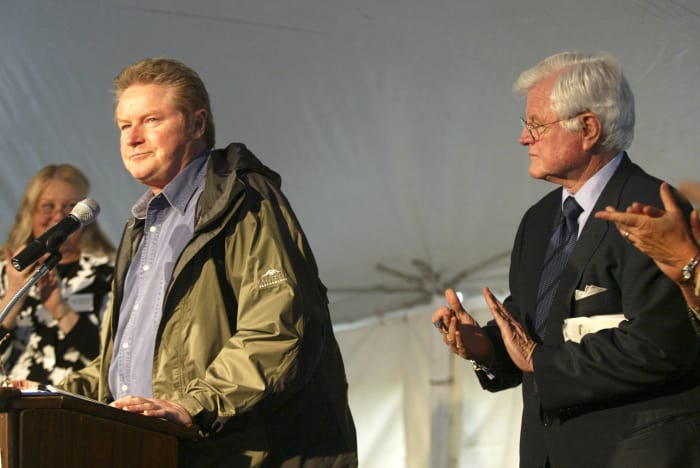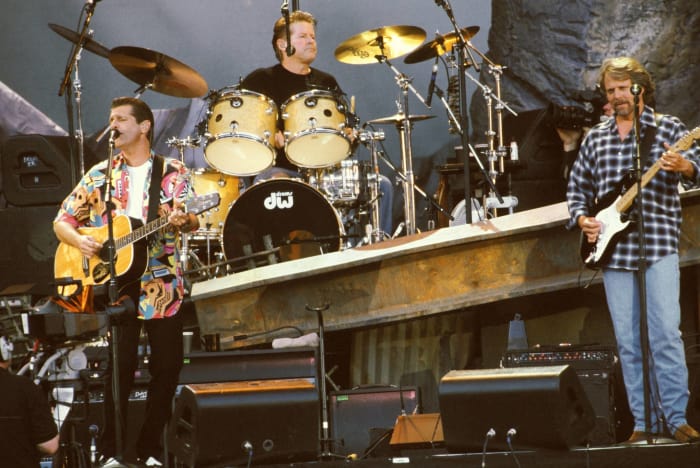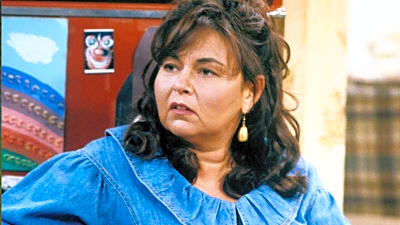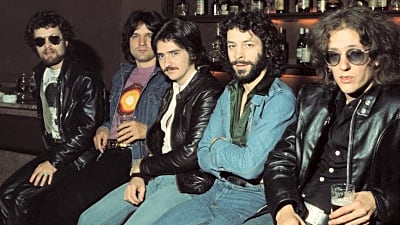Don Henley's professional music career began 46 years ago when the Eagles released their first LP, but he didn't become Don Henley until he wrote and sang lead vocals on the Western-infused ballad "Desperado" in 1973. After a not-so-long run with the Eagles (the band broke up in 1980), he embarked on a hugely successful solo career that found him gradually segueing from a hard rock sound to a more soulful and ruminative aesthetic. On the occasion of his 70th birthday, let's take a look back at the most memorable songs and achievements of the one and only Don Henley.
1 of 26
"Desperado" (1973)
Gijsbert Hanekroot/Redferns/Getty Images
Ask a random person to name his or her favorite Eagles song not named “Hotel California” and there’s a good chance you'll hear “Desperado.” Though never released as a sequel, Henley’s tale of a lonesome man of leisure wandering the Old West has become one of the most beloved American songs of the last 50 years. It’s Henley’s baby, but he’s quick to credit bandmate Glenn Frey with giving the song a proper pop music structure.
2 of 26
"Tequila Sunrise" (1973)
Gijsbert Hanekroot/Redferns/Getty Images
The title of the song originated with Glenn Frey, but Henley’s keen lyrical instincts turned it into more than a novelty song about a popular drink. It’s a laid-back, somewhat weary track about drinking tequila sunrises until the sun comes up. Thankfully, there wasn’t a follow-up song about the subsequent hangover. It was written in the same week as “Desperado.”
3 of 26
"Best of My Love" (1974)
RB/Redferns/Getty Images
The Eagles’ first No. 1 hit topped Billboard’s Hot 100 and Adult Contemporary charts. It’s a classic Frey-Henley composition about — what else? — a love affair that was wonderful until it wasn’t. Like many of the Eagles’ most popular songs, it’s got a strong country vibe, but curiously, it never crossed over to that audience, at least in terms of radio play.
4 of 26
"One of These Nights" (1975)
RB/Redferns/Getty Images
Henley has always said this song was meant to move the Eagles out of their country-rock comfort zone. It’s up-tempo but not much of a rocker. Instead, it sounds like a blue-eyed approximation of an Al Green track. Henley’s vocals are both soulful and wistful. It’s a song about a wonderful future that will likely never come to pass due to procrastination.
5 of 26
"Hotel California" (1975)
Richard E. Aaron/Redferns/Getty Images
How great of a song is “Hotel California”? Radio stations almost always play it at its full six-minute, 30-second length, which is a good three minutes over the length of an average single. It’s an eerily ambiguous song that perfectly captures the haunting quality of Los Angeles just after dusk. Henley’s "Twilight Zone"-inspired lyrics and vocals are perfectly articulated from behind his drum kit. The guitar solos at the end are as indelible as any ever committed to vinyl. It’s one of the greatest rock songs ever written.
6 of 26
"Wasted Time" (1975)
Gijsbert Hanekroot/Redferns/Getty Images
Don Henley’s rough breakup with celebrity designer Loree Rodkin imbues many of the songs on the “Hotel California” LP with a vague bitterness, but it all comes pouring out in the mournful ballad “Wasted Time.” Henley sings directly to Rodkin, blaming her for loving “the boy too well.” By the end of the song, Henley has made his peace with the end of the romance, resolving to get on with his life. He closes out the song hoping that one day their time together won’t be remembered as “Wasted Time.”
7 of 26
"Life in the Fast Lane" (1975)
Koh Hasebe/Shinko Music/Getty Images
The opening guitar lick is 100 percent Joe Walsh, and the ensuing composition sounds like it would be right at home on a Walsh solo LP. But Henley’s scrappy vocals (he also wrote the lyrics with Frey) give it an exhilaratingly dangerous quality. It’s about lovers in an out-of-control relationship built around one commonality: Both of them are “good in bed.” It’s a classic cocaine song, reminiscent of Frey’s later efforts like “The Heat Is On” and “Smuggler’s Blues,” but it feels like it belongs to Henley.
8 of 26
"The Last Resort" (1975)
Michael Ochs Archives/Getty Images
One of Henley’s first environmentally conscious songs was actually the B-side to “Life in the Fast Lane.” It was never a hit and is rarely played on the radio, but Eagles fans consider it one of the band’s finest achievements. It’s a rueful song about humanity’s capacity for destroying the environment, presaging Henley’s Walden Woods Project.
9 of 26
"Please Come Home for Christmas" (1978)
Michael Ochs Archives/Getty Images
R&B legend Charles Brown recorded this seasonal ditty in 1960, but it didn’t become a holiday classic until 1972 when it reached No. 1 on the charts. Henley was a huge fan of Brown, so the band laid down a nifty version of the song in 1978. It wasn’t quite as big a hit for the Eagles, but, in the frustratingly segregated world of radio, it’s the version you hear on classic rock stations.
10 of 26
"The Long Run" (1979)
Richard E. Aaron/Redferns/Getty Images
Hey! It’s a not-entirely-bitter song about romance from Don Henley! Oh, it’s plenty fatalistic, but Henley’s lyrics take a wait-and-see approach to the future of the relationship, wondering if they’ll be able to make it in “The Long Run.” Considering the browbeating Henley gives the woman in the lyrics (he really goes in on her lack of confidence), Splitsville seems an exit or two ahead, but at least they’re together for the duration of the song. That’s more than can be said for most Henley compositions.
11 of 26
"Leather and Lace" (1981)
Ray Mickshaw/WireImage/Getty Images
Henley was allegedly dating Stevie Nicks when the two teamed for this folksy duet. The song is often mistaken as a Fleetwood Mac song, which is obviously owing to Nicks being the sole songwriter here, but Henley’s raspy vocals offer a nice contrast to Nicks’s warbling. It’s a great song that’s been covered several times over the years, mostly by country artists.
12 of 26
"Johnny Can't Read" (1981)
Richard E. Aaron/Redferns/Getty Images
Henley’s first single after the breakup of the Eagles is a sarcastic lecture about illiteracy. The frantic organ riff that drives the song feels like an angry affectation. Henley’s pissed off at society, so here’s a track that’s gleefully out of step with the times. Released in 1981, Henley takes aim at the video game phenomenon that was sweeping the country, adding it to the list of distractions that keep people from being avid readers. It’s hard to argue Henley didn’t have a point.
13 of 26
"Dirty Laundry" (1982)
Pete Cronin/Redfern/Getty Images
Henley became a tabloid target in 1980 when two underage girls (aged 16 and 15) were arrested at his house for prostitution and being under the influence of drugs. Though he cites the media-sensationalized deaths of John Belushi and Natalie Wood as the primary influences on “Dirty Laundry” (his first big hit as a solo artist), it seems likely that his own private-turned-public travails are what give this organ-driven screed its furious kick. It’s an exceptionally angry song.
14 of 26
"The Boys of Summer" (1984)
Ron Galella/Getty Images
The lead single off of “Building the Perfect Beast” is unquestionably Henley’s most well-known song. A wistful acknowledgment of one’s passage into middle age, Henley expresses resignation at his generation’s wholesale sellout to capitalism and conservatism (exemplified by the lyric “Out on the road today, I saw a deadhead sticker on a Cadillac"). The song won Henley a Grammy and was later covered by the pop-punk outfit the Ataris.
15 of 26
"Sunset Grill" (1984)
KMazur/Getty Images
This is an awfully dramatic song about a hamburger stand next to the Guitar Center on Sunset Boulevard in Los Angeles. It’s a bit of an all-star affair: The sophisticated synthesizer riff was composed by Randy Newman, while Patty Smyth sings harmony. It was released as a single more than a year after the release of “Building the Perfect Beast” and remains a favorite of die-hard Henley fans.
16 of 26
"Not Enough Love in the World" (1984)
Boston Globe/Getty Images
Another failed relationship song from the king of sulkers, “Not Enough Love in the World” is rumored to be about Stevie Nicks. As always, Henley is open to getting back together with his ex-lover, but he allows that this is a pipe dream. It’s a joyless, borderline ballad, but it was a huge hit on adult contemporary radio.
17 of 26
"All She Wants to Do Is Dance" (1984)
Richard E. Aaron/Getty Images
This up-tempo rocker is a dance track with a conscience. While the nasty synth riff grooves in the background, Henley sings about rebels, Molotov cocktails and arms dealers. It seems to be vaguely about the United States’ involvement in Nicaragua, but the country is never named. The song was later used to hilarious effect in the 1985 comedy “Real Genius.”
18 of 26
"The End of the Innocence" (1989)
Jeff Kravitz/Getty Images
After a five-year layoff, Henley returned with the critically acclaimed LP “The End of the Innocence.” The title track — unmistakably produced by Bruce Hornsby — is a post-Reagan-era lament about a mostly ruined world. Henley doesn’t have any answers for how to make things better, nor does he have interest in trying. It’s a frustrated Baby Boomer song about escape.
19 of 26
"The Heart of the Matter" (1989)
Jeff Kravitz/Getty Images
This is either a beautiful song about a man understanding his role in a breakup or a selfish, passive-aggressive request for an apology. Henley sings about the need to move on despite still being deeply in love with his ex-girlfriend (who’s just found a new man), but it’s unclear who’s supposed to be forgiving whom. Regardless, it’s a great breakup song. After all, people don’t always have the clearest perspective on these things.
20 of 26
"New York Minute" (1989)
KMazur/Getty Images
The song that inspired an episode of NBC’s “The West Wing”! It’s a somber number that opens with a Wall Street worker either committing suicide by jumping in front of a subway train or stripping off his clothes and streaking into oblivion. Again, Henley’s lyrics aren’t terribly specific. The song never cheers up, but it does suggest that love can at least provide temporary shelter.
21 of 26
"The Last Worthless Evening" (1989)
PAUL J. RICHARDS/Getty Images
The story is too long to relate here, but do yourself a favor and track down the saga of Don Henley’s humiliation at the hands of Michelle Pfeiffer (with a guest appearance by Jack Nicholson). It evidently inspired this lovely ballad, which is sung from the perspective of a lonely, lovelorn dude trying to convince a woman to take a chance on him.
22 of 26
"I Will Not Go Quietly" (1989)
Dana Nalbandian/Getty Images
This is a defiant song in which Henley, tired of having his heart broken, resolves to “tear it up,” “trash it up” and “shake it up.” To underscore the seriousness of his intent, he brought on Guns N’ Roses’ Axl Rose to sing background on this track. Released as a single in 1989, it would be Henley’s last solo hit until 2000.
23 of 26
The Walden Woods Project (1990)
Boston Globe/Getty Images
Don Henley was aghast when he learned that two housing developments were going to befoul the sacred environmentalist ground of Walden Woods (made famous by transcendentalist Henry David Thoreau). In 1990, he founded the Walden Woods Project, and with the help of many celebrity fans, he played a significant role in successfully blocking the proposed development.
24 of 26
"Get Over It" (1994)
Roberta Parkin/Getty Images
Hell froze over in 1994 when the Eagles put aside past acrimony and got back together for a new studio LP and a tour. The album was far from their best work, but this vitriolic track is prime Henley if nothing else. Henley’s hard-rocking fury is this time directed at people who blame their problems on others. It’s a tough-minded, oddly conservative sentiment from the steadfastly liberal Henley, but hey, he contains multitudes.
25 of 26
"Taking You Home" (2000)
Anne Cusack/Getty Images
Henley’s solo career resumed in 2000 with the LP "Inside Job," which found the old-school rocker fully embracing the world of adult contemporary music. While the album connected with his core audience, it comes off as a half-hearted rehash of “The End of the Innocence.” But the hit single “Taking You Home” is a welcome departure for Henley in that he’s at last madly in love and imagining something akin to happily ever after (with his current wife Sharon Summerall).
26 of 26
"Cass County" (2015)
Ron Elkman/USA TODAY NETWORK
Fifteen years after “Inside Job,” Henley went back to his country roots with “Cass County.” There’s still some rock-and-roll influence here (Mick Jagger sits in on the song “Bramble Rose”), but his collaborators, including Merle Haggard, Vince Gill and Dolly Parton, mostly hail from the country world. It’s a nice, unambitious collection of music from a man who simply wants to share his love of music with the world. It’s the least cranky thing he’s ever done!
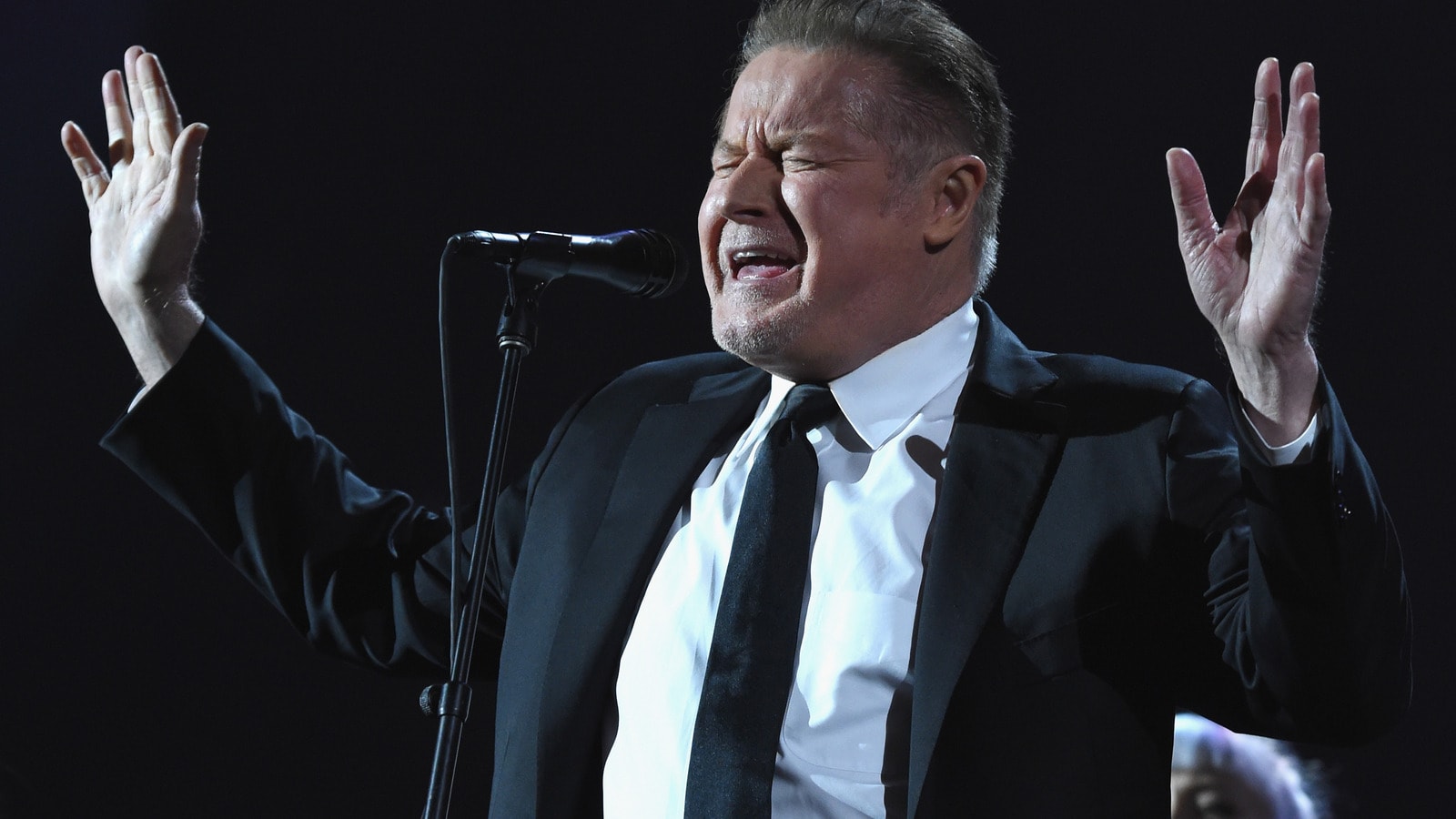
 +
+

